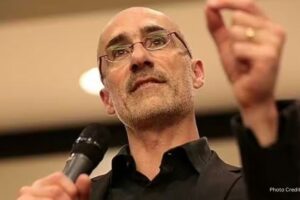On a sharp winter afternoon in Delhi, the air brittle with cold, I found myself escorting a hero from my school days—Sir Ben Kingsley, accompanied by his wife, Lady Daniela Lavender—through the grand, ordered avenues of Lutyens’ Delhi. The city, with its imperial geometry, its broad boulevards and insistent roundabouts, seemed to hold its breath as we ascended Raisina Hill, where the solemn edifices of India’s governance stand sentinel. From that vantage, India Gate shimmered faintly in the distance, a monument to a past both proud and burdened.
As our car glided down Rajpath (now Kartavya Path), Sir Ben’s voice, soft yet precise, broke the silence. He spoke of 1981, of a January day so cold it seemed to freeze time itself, when he, as Mahatma Gandhi, lay prone atop a gun carriage for the funeral march scene in Attenborough’s Gandhi. It was no mere film sequence but a feat of orchestration, a vast, unwieldy tableau of 300,000 souls—80,000 ferried by special buses, 200,000 drawn by their own volition, and a disciplined cohort of the Indian armed forces. The road was sealed, the clock unforgiving; a single take, captured by eleven camera crews spooling 20,000 feet of film, was all they had. Sir Ben, motionless, embodied the stillness of death, while Lord Attenborough, cloaked in military garb to merge with the masses, directed this colossal act of remembrance. The resulting 125 seconds, etched on celluloid, remain a monument in themselves, unmatched in scale, a record of human convergence in the service of art.
When the scene ended, Sir Ben rose to a tide of applause from crew and crowd alike, a moment that clung to him, he said, like a second skin. That role would carry him to an Oscar, and the film, Gandhi, would lodge itself in the annals of Hollywood, its glow undimmed by time. Among the throng of unknowns who filled its frames were figures who would later claim their own renown: Daniel Day-Lewis, then a mere whisper of his future self, muttering lines as Colin in a South African scene; the brothers Sudhanshu and Sudhir Misra; Aseem Chhabra, a critic whose face flickers briefly; and my friend Jai Pathak, now a formidable lawyer in Los Angeles, who played a fleeting part.
Years later in 2010, in the brazen light of a Los Angeles summer, I was summoned by Sir Ben to an event of singular honor: the unveiling of his star, the 2410th, on the Hollywood Walk of Fame. His career—spanning Gandhi, Schindler’s List, Sexy Beast, House of Sand and Fog—had carved a path through four decades, and this star was its gleaming punctuation. I had met him in cities across the globe, each encounter peeling back the layers of a man both luminous and elusive. Yet I was unprepared for the intimacy of the occasion, a gathering restricted to a handful of close confidants. At the edge of the Chinese Mann Theatre, I stood beside the towering Bruce Willis and the reticent Jerry Bruckheimer, their presence a quiet counterpoint to Sir Ben’s elegance as he spoke. His wife Daniela and son Edmund stood near, and I, caught in the orbit of this moment, could not suppress a smile that felt like a confession.
The night spilled into a celebration at Nirvana in Beverly Hills, where tandoori chicken, garlic naan, and curry scented the air. Sir Ben, ever the alchemist of words, took the microphone, his voice a blend of gratitude and gravitas. “This glorious night,” he said, “honors my wife, my son, my friends, my family. You are ingrained on my heart, as firmly as my star is engraved on the Walk.” The words, simple yet weighted, hung in the room, a testament to a life lived in pursuit of meaning.
For Sir Ben Kingsley, the role of Gandhi was not merely a performance but a revelation. In tracing the arc of that singular life, he had glimpsed a truth: that the purpose of life is a life of purpose. And for me, that day—its warmth, its weight—remains a shard of eternity, a moment when the rarest of stars illuminated the ordinary.















